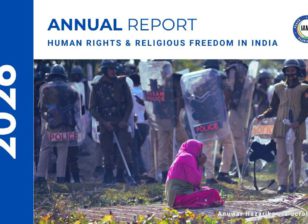National bill on anti-minority common law introduced
A bill suggesting the national implementation of an anti-pluralist and majoritarian law, the Uniform Civil Code (UCC), was introduced in India’s upper legislative house by a lawmaker belonging to the ruling Hindu supremacist Bharatiya Janata Party (BJP).
The UCC would revoke religion-specific laws used by minority communities in personal matters such as marriage, divorce, and inheritance. Minorities would then be forced to follow one common law regardless of their religious beliefs, making the UCC a popular demand among Hindu supremacists.
Opposition leaders urged that the bill be withdrawn as it would “destroy the secular fabric of the country.”
A total of 63 members voted for the bill while 23 votes were against it.
Activists have called the UCC a violation of freedom of religion and an invasion of the private lives of citizens, particularly Muslims and Christians.
Three months after bail order, Muslim journalist Siddique Kappan remains imprisoned
Despite three months having passed since Muslim journalist Siddique Kappan was granted bail by the Supreme Court, the verification of his bail is still pending, forcing him to remain incarcerated as a Prisoner of Conscience.
Kappan had been in jail for over 700 days, during which he faced extensive physical and mental suffering before the Supreme Court granted him bail in September this year.
The “endless delay” in his release is unjustifiable, said his wife, Raihanath Kappan.
Kappan was arrested in October 2020 while traveling to the Hathras region of Uttar Pradesh to cover the rape and murder of a teenage Dalit girl by caste-privileged Hindu men. Due to his Muslim identity, Kappan was detained under India’s draconian anti-terror law, known as the Unlawful Activities Prevention Act (UAPA), under false accusations of seeking to cause tensions between Hindus and Muslims.
“Justice delayed is justice denied. Three months have passed since we provided the sureties for bail in the UAPA case,” said Kappan’s lawyer, Mohamed Dhanish K.S.
Despite international outrage, Kappan has faced inhumane treatment and conditions while imprisoned, including being beaten, mental torture, and failing to receive adequate healthcare.
The United States Commission on International Religious Freedom (USCIRF) has listed Kappan on its Freedom of Religion or Belief Victims List, along with over 30 other Indian victims of detention based on religious identity.
Muslim students booked for commemorating mosque demolished by Hindu extremists
Police in BJP-ruled Uttar Pradesh state booked a number of students from Aligarh Muslim University for organizing an event to mark the 30th anniversary of the Hindu supremacist demolition of the historic Babri Mosque.
Police acted on demands made by Hindu supremacist groups, who called for the students’ arrest despite the fact that it was a campus event.
On December 6, 1992, tens of thousands of extremist Hindus gathered near the mosque site, climbed the mosque, and demolished it with axes and hammers. The demolition sparked nationwide anti-Muslim violence that left some 2,000 people dead, mostly Muslims.
The students who held the event displayed posters calling the anniversary of the demolition a “Black Day,” triggering a backlash from Hindu extremists.
On November 9, 2019, the Supreme Court awarded the mosque site to Hindus for the construction of the temple, handing the BJP a victory to drive home its Hindu nationalist agenda. Muslim groups and activists called the verdict a “blatant injustice towards Muslims.”




